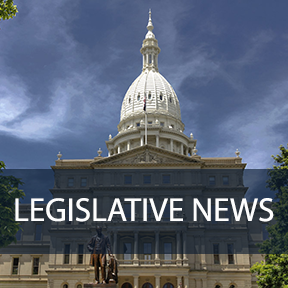MEA members share stories of student loan debt relief with U.S. Ed Secretary: ‘For me, it was life-changing’
By Brenda Ortega
MEA Voice Editor
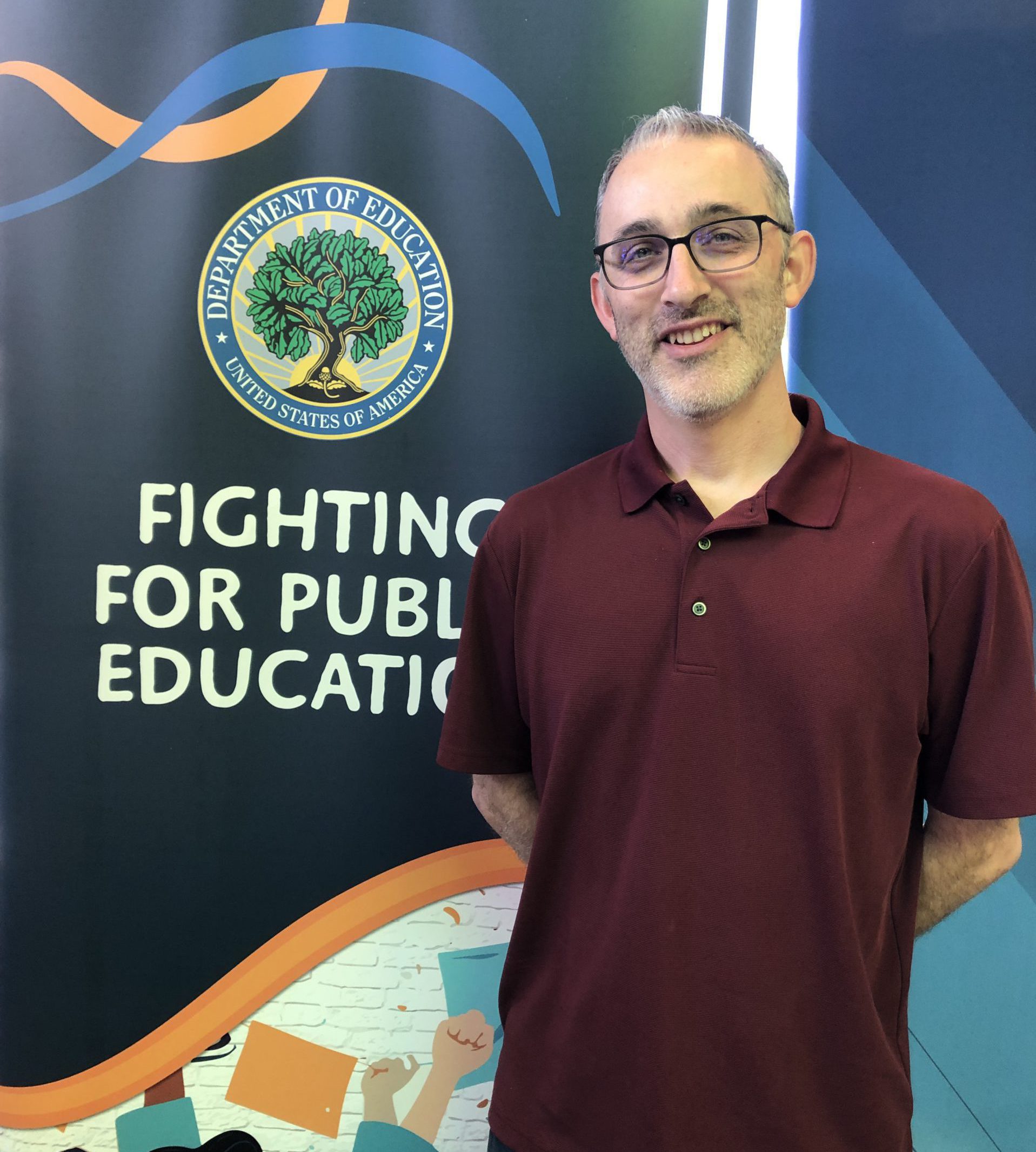
Growing up in Michigan’s Upper Peninsula from a family of very modest means, MEA member Ron Denning knew he wouldn’t have parental help paying for college to pursue his dream of becoming a teacher—he’d have to borrow. But that was OK, he was told, “It’s good debt.”
Denning figured he wanted to improve his life, and getting a college degree would pay off later, so he took out loans needed to graduate from Western Michigan University and started his first job at Grandville Public Schools 20 years ago. His starting salary was less than $40,000.
“Right after that I met my wife and got married,” Denning said at a recent press conference on the subject of educators and student loan debt. “Our weekly food budget was $50. I had this incredible debt and a large student loan payment to make on a starting teacher’s salary.”
Even worse, over time the amount owed didn’t shrink much, said the technology teacher who is treasurer of his local union. “It was just something I was going to live with. I would always pay on it, but it would probably be there until the day I die.”
That all changed after President Joe Biden pledged to fix problems in federal Public Service Loan Forgiveness (PSLF) to ensure the program would deliver promised relief to people in public service careers as Congress intended when a bipartisan majority passed it in 2007.
Fixing Public Service Loan Forgiveness
The PSLF program was meant to erase remaining federal student loan debt after 10 years for those who worked in public service roles and made 120 qualifying payments. However, when the first participants became eligible for forgiveness in 2017, the Trump administration denied 98% of applications.
Between 2017-21 only 7,000 people were granted loan forgiveness nationwide under the program, said U.S. Secretary of Education Miguel Cardona, who led the press event at Grand Rapids Community College joined by NEA President Becky Pringle and MEA President Chandra Madafferi.
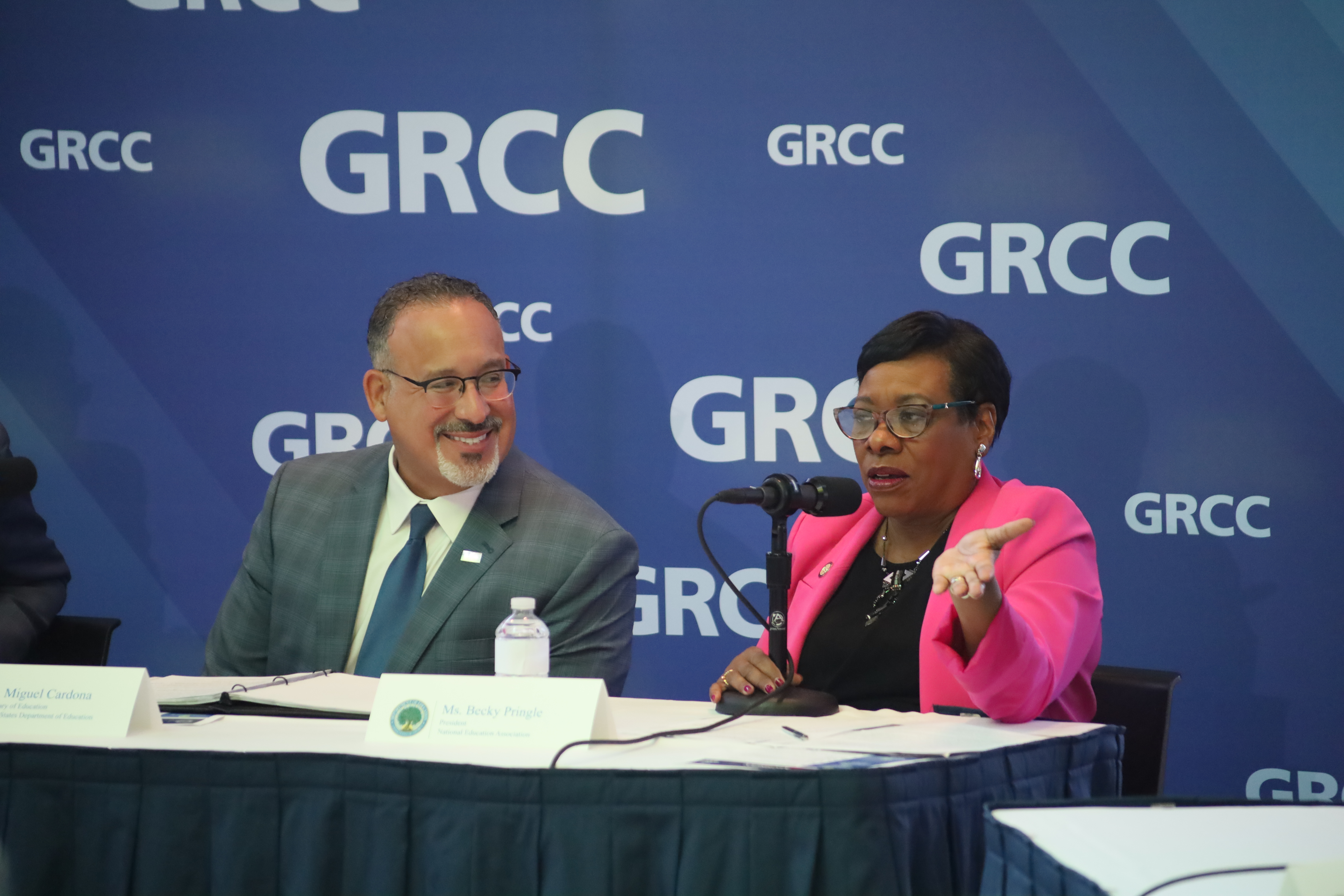
Since then, that number has risen to 947,000 applicants and counting who have received $70 billion in loan debt relief, Cardona said. Denning was among those who benefited from program improvements: Just under $57,000 of his remaining federal loan debt has been forgiven.
“We’ve got to stop normalizing teachers driving Uber, teachers bartending, teachers qualifying for state assistance,” Cardona said. “When we talk about fighting for public education, we’ve got to fight for our educators too. That’s what we’re doing at the Department of Education. That’s what the Biden-Harris team is doing.
“We are advocating on behalf of those hard-working folks who are trying to make our communities better, and we’re not going to stop.”
Expanding debt forgiveness has long been a priority for NEA members who lobbied for PSLF changes, Pringle said at the event. In surveys, educators said loan debt was second only to low salaries in discouraging them from staying in the profession or recommending the career to young people.
“We need these stories told so we can support this program, we can grow this program, and we can make a difference for every one of our students,” Pringle said. “We know the most important factor is that teacher and that support staff in classrooms and worksites helping our students be able to live into their brilliance.”
The event earlier this month was part of a multi-state Back to School Bus Tour by several officials from the U.S. Department of Education to highlight ways in which the Biden-Harris administration has fought for public education and delivered resources to schools amid unprecedented challenges.
“President Biden and Vice President Harris are fighting for public education to make sure we have a highly qualified, supported teacher in every classroom in this country,” Cardona said. “Our kids will not grow if we don’t invest in our educators and invest in our schools.”
In addition to the conversation around student loan debt forgiveness at Grand Rapids Community College, the tour stopped at schools in East Lansing and Detroit where programs supporting student mental health and teacher recruitment illustrated other key Education Department priorities.
MEA support for PSLF applications
Another MEA member who told her PSLF story, Judy Warren became a social worker in Kalamazoo Public Schools to help children overcome barriers to success like she was helped as a six-year-old struggling with anger and confusion after her father died, she said.
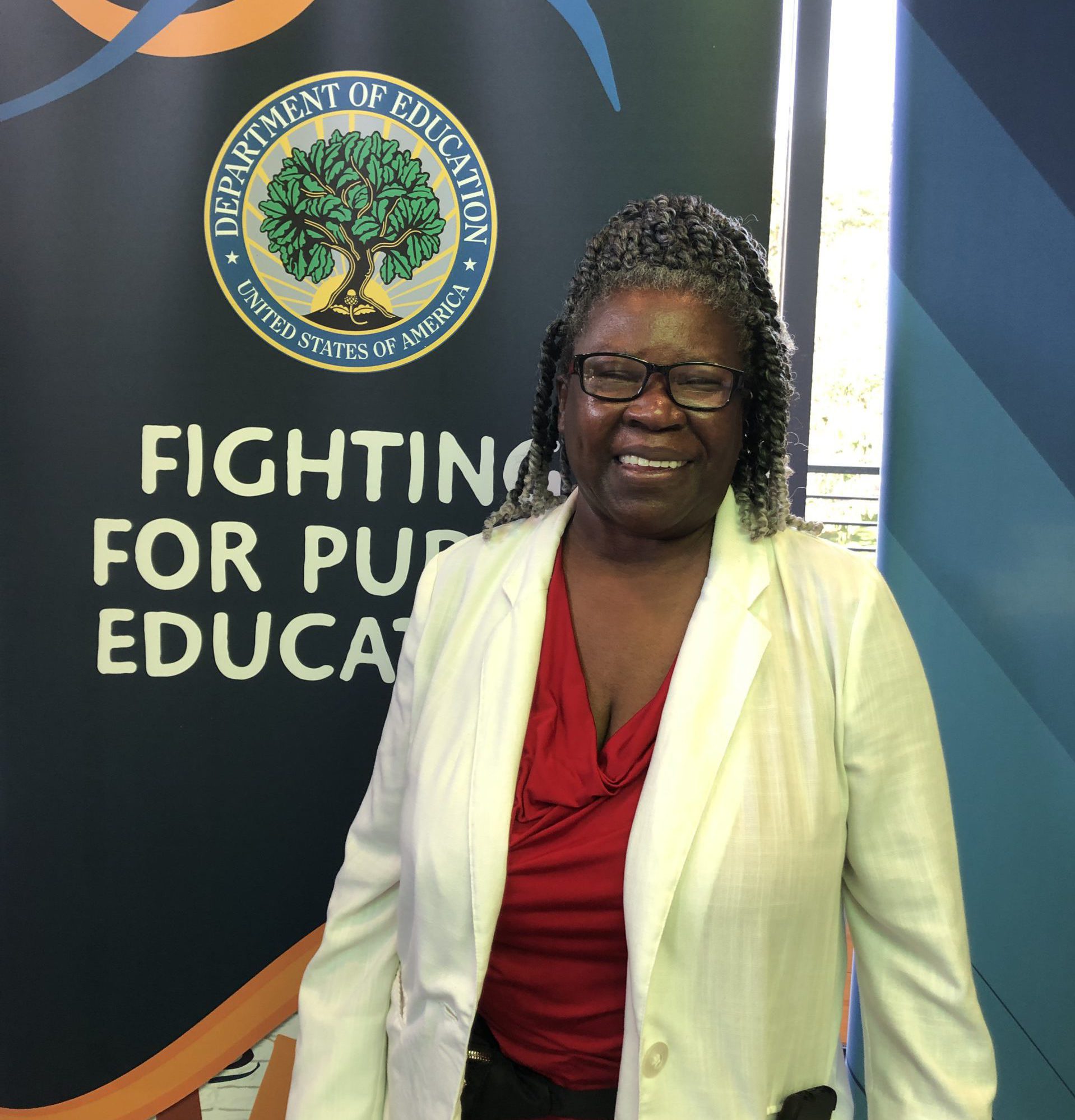
“I became a school social worker and loved that. It was hard work, but it was good work, and you realize you’re impacting children’s lives.”
Warren began making payments on federal student loans in 1998, stopping only during a forbearance period when her husband became disabled, yet the balance actually grew, she said. When she heard about PSLF, she applied but couldn’t figure out how to qualify through the online application.
“It was a struggle,” she said. “I got so frustrated, for a whole year I stopped because it was too much. It was overwhelming.”
Then Warren was contacted by MEA UniServ Director Christine Anderson, who leads a cadre of MEA staff who provide training and one-on-one help to members applying to the program. Anderson encouraged her to try again.
“She reconnected with me and said, ‘Look—we’ve got to get this done,’ and that motivated me to get back in there… And when I got that letter that said ‘Congratulations,’ I was so excited I called up everybody. I carry this letter with me.”
Warren’s balance of $45,962.46 was forgiven after decades of payments, and the relief came just in time. Various personal factors led to her retire earlier this year, and getting out from under the student loan debt and a big monthly payment was “like a weight off my back,” she said.
NEA and state affiliates including MEA have become valued partners in ensuring the PSLF program is accessible and delivering results, Cardona said. “We needed partners in the field to operationalize this benefit… and Becky Pringle knew the assignment.
“We’ve benefited so much in this country thanks to the leadership of Becky and the NEA who said, ‘We got you; we’re going to make it comprehensible. We’re going to train our folks to help educators understand how to do it.’”
NEA created a digital tool—Student Debt Navigator—to help members explore options, and across the country union staff like Anderson took on the task of helping individuals in small groups or one by one, Pringle said: “We knew we could not have educators who are not familiar with this life-changing program.”
Life-changing debt relief
MEA member Jeremy Zeiler stood at a troubling precipice when his loan forgiveness came through, he told Cardona and the panel. The special education teacher in Byron Center had been struggling to raise a family and manage a large monthly payment from $90,000 in student loan debt.
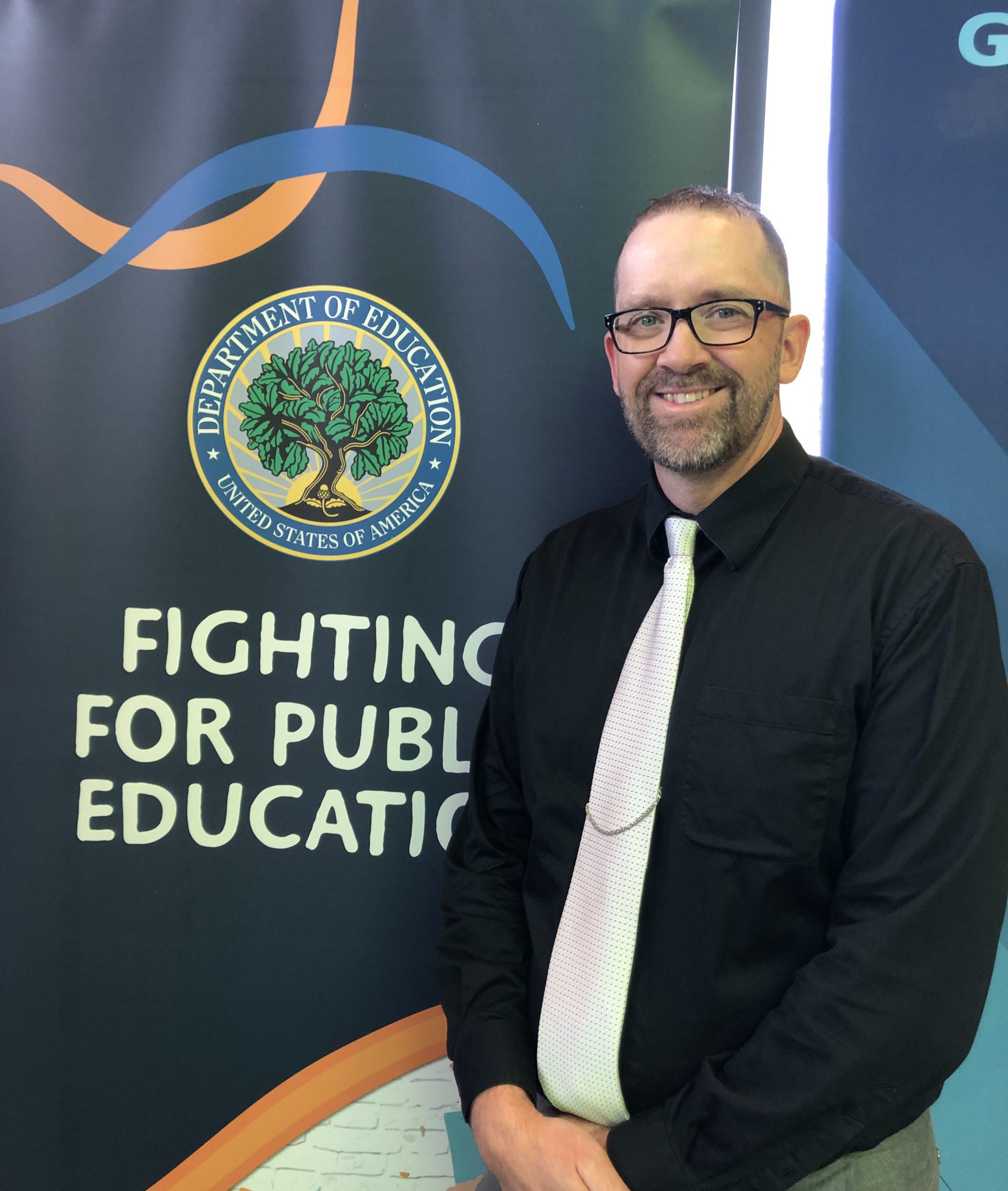
Then his nearly 20-year-old truck gave out, and the prospect of a car payment loomed. “I was thinking, man—I’m going to have to get a second job on the weekends to pay for this loan. And I was very worried about that because that’s time taken away from my family, time away from my kids.”
But soon Zeiler received notice that his federal loan debts had been erased. After making payments for 12 years, he had still owed nearly $77,000. “When that happened, it opened up the opportunity for me to spend more time with my family—not having to get a second or third job.
“For me, it was life-changing.”
The stories of Zeiler, Warren and Denning illustrate equity issues around student loan debt, Cardona and Pringle said. Students from disadvantaged backgrounds tend to carry more loans to get through college, and runaway debt from predatory terms makes it hard to ever pay it back.
“We don’t want our high school students who want to go on to college saying, ‘I can’t afford those payments; I’m not going to college,’ but that’s what is happening in this country,” Cardona said. “And we don’t want our educators saying, ‘I’m going to default, I need a second job, I’m leaving the profession.’”
Continuing advocacy for broader student debt fixes
The federal PSLF program was broken when the Biden-Harris administration entered the scene in 2021. Trump’s Education Secretary, longtime Republican donor Betsy DeVos, was not interested in fixing it despite the abysmal 2% approval rate under her leadership.
Making PSLF work is one part of an effort to improve higher education access and affordability, recognizing that society has shifted the cost to young people who now borrow much more to complete a degree, Cardona said.
Around student loan debt, other more general programs to lower monthly payments and offer more young people paths to debt reductions or forgiveness have been slowed by lawsuits from Republican-controlled states.

However, the administration has not been deterred, and further improvements to the PSLF program will be rolled out soon aimed at preventing runaway interest and making it easier to apply, Cardona said.
He plugged community colleges as “the backbone of our economic development in this country,” with innovative programs offering students access to job skills and good-paying jobs, and concluded with a reminder that educators make all of it possible: “We have to do better with teacher salaries.”
NEA’s three million members agree public education is the foundation of democracy and opportunity, Pringle said. Listening to educators’ struggles and needs is key to addressing the chronic educator shortage, a commitment demonstrated in action by the Biden-Harris administration, she said.
“One of the things I so appreciate from the Secretary in the Department of Education’s partnership is in the way they were not going to be deterred,” Pringle said. “Because they said ‘We’re going to find a way,’ we all have heard these incredible stories today.
“And because NEA committed to help every single educator access this benefit they are owed, we have heard life-changing stories over and over again of educators able to stay in the profession, afford to have a family, buy a house. When that happens to you, you can’t stop telling your story.”



